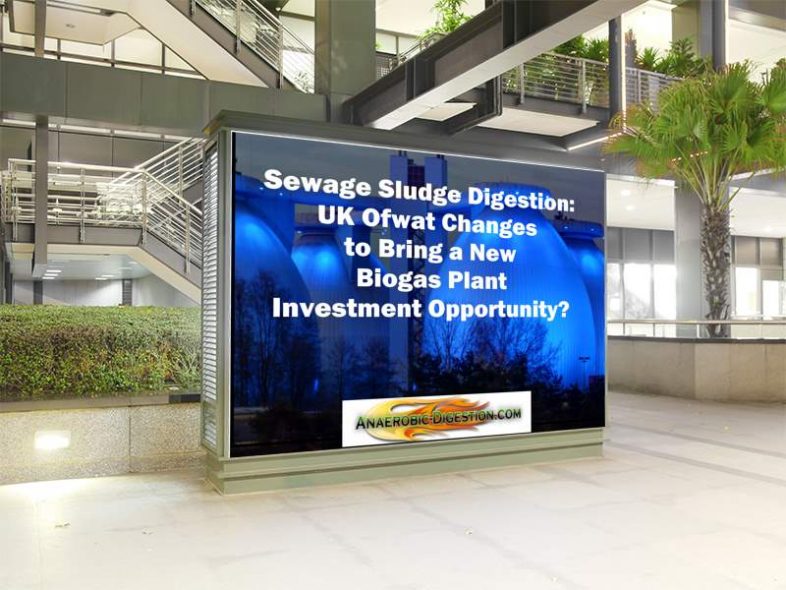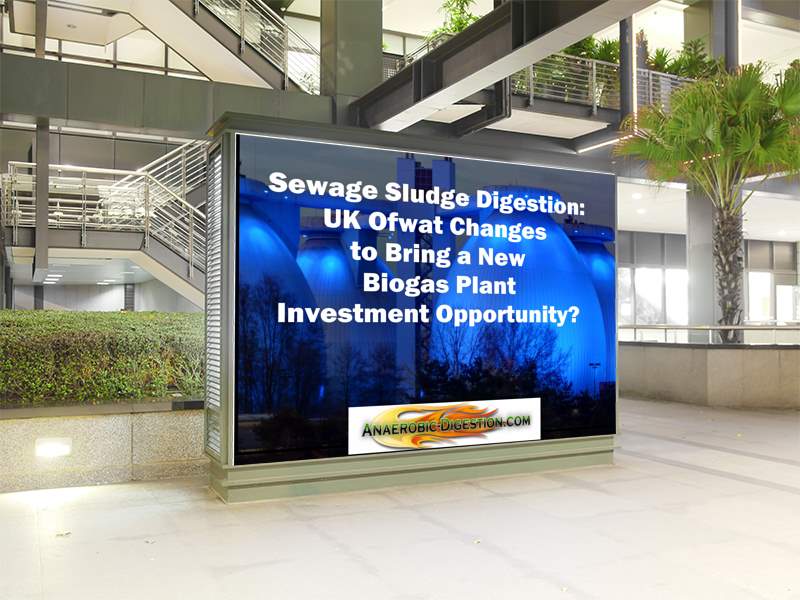Five years ago, in this article, we announced that sewage sludge digestion would be put out to tender as an outsourced service by many, or all UK water companies. The opinion we gave was that there would be big opportunities from Ofwat for companies to take sewage sludge and co-digest it.
We looked forward to the liberalising changes which for the first time would allow Water Utility Companies to export their sewage sludges to the private sector and especially to the anaerobic digestion plant operators of the nation.
Has it become an investment opportunity?
No!
What we did not see coming was that the water utility companies would so quickly come to realise that biowaste (sewage sludge) has value when digested. That being the case:
- (mostly from the renewable biogas energy it produces), plus
- the massive PR value to water utilities keen to publicize “green credentials”,
is it any wonder that they no longer wish to part with it?
We don't think so. So we have archived our original article below, which you will still find worth reading.
Sewage Sludge Digestion Ofwat UK Changes to Become an Investment Opportunity?
 Now is the Time to Invest in Sewage Sludge Digestion Biogas Company Skills
Now is the Time to Invest in Sewage Sludge Digestion Biogas Company Skills
It just might be the time to invest in Sewage Sludge Digestion. All the most successful financial investors know that timing is everything, and now could be the right time for sewage sludge digesters!
There is a right time to enter the market and a wrong one. This advice would not be wasted on manufacturers of equipment for the treatment of wastewater right now.
Ofwat is changing the rules which the UK privatised water utility companies have been required to operate their Wastewater Treatment Works (WwTWs) since they were created under the Water Act in the 1970s. No longer are they legally obliged to take responsibility to treat all the materials entering their wastewater treatment facilities.
In future, they will be allowed to outsource sewage sludge treatment to biogas facility operators. The opportunity lies in the co-digestion of sewage sludge with other more rapidly digested wastes such as food waste.
Although sewage sludge takes longer to digest, a baseline throughput of sewage sludge improve digester stability, after all, sewage sludge generation is not seasonal. Most other biowastes are very seasonal, and food waste varies load by load. The microorganisms in a digester like a high consistency of feeding. This is the big advantage sewage sludge can provide.
Despite the fact that there is a litany of promising technologies brought to the marketplace only to fail. Fail, because they were the right product, but at the wrong time. However, it remains as true as it ever was, that investing in the right technology at the right time, can be wonderfully profitable!
Identifying the right time to enter any market is not easy, but the signals emerging at the moment for sewage sludge digestion, give a clear message. That message is that a great opportunity may be coming soon!
Considering that climate change is beyond headline news, and at all levels, the expectation is the implementation of carbon reduction measures will boost the value of green investments such as in sludge treatment by anaerobic digestion.
Expanding biogas digestion will be a boost for companies and the nation to comply with net-zero targets.
The duty rests with companies and governments to ensure that the ambitions of last December's 2015 Paris Agreement are met. Massive internationally agreed emissions reduction targets, must now be carried forward by all nations.
Why Not Start a Massive Program to Build Sewage Sludge Digesters?
For these carbon emissions targets to be met, one of the first and most obvious areas where there are big benefits yet to be gained is in the anaerobic digestion of sewage sludge. Even now this is a technology which has been so far, greatly under-used in many countries. Much more can still be done to reduce climate-changing emissions by using anaerobic digestion technology at sewage works.
Incineration of sewage sludge which was the favourite solution until 10 to 15 years ago, is now too costly in terms of its energy use, let alone its high carbon emissions.
That means as those sewage sludge disposal plants come up for renewal they will be converted to anaerobic digestion plants, which can in most cases be profitable. The latest generation of WwTw digesters are income sources hen built using modern sludge preconditioning methods, (and often as high gas yielding, 2 stage mesophilic or thermophilic digestion processes), provide all the electrical power needed to run the sewage treatment works (WasteWater Plants) that feed them with sludge.
By using the sludge produced by a sewage works to power its own processes, the carbon emissions from wastewater treatment fall drastically. This is a big win, and it won't go unnoticed by climate change policymakers.
Not only that, the anaerobic digestion process provides the ability to recycle sewage sludge nutrients in a safe way, to the land. It is also referred to as anaerobic treatment.
As if that was no not, its own, a commanding reason for the biological digestion of sewage sludge the newest, most advanced sewage sludge treatment AD plants, now coming on-stream also recycle phosphate. The availability of adequate phosphate is essential to all life including crop growth, but it is a finite natural resource, and its recycling will in the future become increasingly important in terms of sustainability.
Finally, there is a rising awareness that many nations, including the UK, are no longer in charge of their own energy supplies. Large energy imports can jeopardise the security of supply.
If a country suffers a lack of energy supply from imported energy sources leading to energy rationing, what could be better than the water companies, who are usually also responsible for clean water provision, being in control of their own electricity supplies.
Conceivably, clean water could be made available throughout crises which might otherwise jeopardise national water supplies and the health of the public.
UK Developments in Sewage Sludge Digestion
The UK's water industry regulator, Ofwat (in Ofwat's published 2020 proposals) has made it clear that in the next periodic review it will be most likely to open up the UK market for sewage sludge disposal/ processing. Unlike many other countries, the UK Water Act which privatized the water industry in the UK made it the duty of the water undertakers to themselves dispose of sewage sludge responsibly.
At that time, when most sewage sludge from large conurbations in the UK was disposed of to sea, sewage sludge had no possibility of being conceived as a by-product that could have value for its energy content.
Now that that has changed, the regulations which until now, in the UK, have effectively prevented the opening up of sewage sludge digestion as a function that could be isolated from sewage treatment, will be changed.
The change will quite possibly require the Water Companies to, for the first time, make available their sludge for others to take and treat, and the basis will be much more upon the financial benefits, and secondly the environmental benefits of so doing.
This will be part of Ofwat's policy of continuing to require a much greater commitment to sustainability, on behalf of the Water PLCs. The day has truly arrived for sewage sludge digestion Ofwat must now realize.
At the same time, the pressure on sludge disposal to land continues to increase. The space available for landfilling of solid waste continues to diminish. The use of the space that is available has been progressively restricted by European directives. However, after anaerobic digestion treatment, there is an opportunity to re-classify the digestate it produces not as a waste but as a product.
Reading these signals could not be simpler: the future is anaerobic, and sewage sludge from sewage works of all sizes could soon be available to any bidder, within or outside the UK Water Industry, to take it, and process it both for energy and its physical by-products.
Existing Waste Management Industry Businesses will be Well Placed to Bid for Sewage Works Sludge
Sewage sludge is actually a difficult substrate to treat anaerobically.
The anaerobic digestion of sewage sludge requires a long hydraulic retention time (upwards of 12 days) in heated digesters, which leads to a capital-intensive process. Research led initiatives over the last decade have led to improved reactor designs, incorporating preconditioning of sewage sludge by methods such as high pressure and temperature hydrolysis, enzyme hydrolysis, and sonification. However, sewage sludge, by its very nature, is much harder to digest than organic materials such as the organic content of domestic waste, including food waste).
The Waste Management Industry may find that it can absorb considerable amounts of sewage sludge through co-digestion of this material with other wastes, such as food waste, and by so doing maximise the use of existing anaerobic digestion plant. For example, sewage sludge varies very little seasonally, whereas many other organic waste AD plant feedstocks can be highly seasonal. The co-treatment of sewage sludge in a seasonally affected biogas plant may provide for a much more stable population of active biomass, in the reactor, allowing a highly beneficial synergistic use of sewage sludge when co-disposed.
Sewage Sludge Digestion Ofwat Changes: A Conclusion
Many Waste Management Industry biogas plant operators have made big strides toward the enhanced performance of their anaerobic digesters through innovation, already. Those that recognise the impetus to re-evaluate the anaerobic treatability of many of their industrial waste streams now will do well. The race will be on, to decide upon cost-effective, and sustainable, sewage waste treatment strategies to use sewage sludge in their plants, and build new ones where applicable.
The businesses that innovate and co-dispose existing waste management industry organic materials which can generally be treated at much higher organic loading rates than sewage sludge, in combination with sewage sludge will have a great opportunity from now on in the UK.
Anaerobic digestion should no longer be seen as a process for stabilizing sludge by anaerobic treatment, but as an opportunity to recover the energy embedded in the substrate.
As long ago as 2007, it was estimated (See “Anaerobic Energy”, Waste & Wastewater Treatment Magazine, March 2007) that conventional anaerobic digestion of the UK's municipal solid waste could generate 1.4GW electricity or 1.9% of the nation's demand. If these calculations also include potential energy generation from sewage sludge, then anaerobic digestion would be a still more significant player in the renewable energy market.
[box type=”info” size=”large” style=”rounded” border=”full”]Since this article was written there have been additional reasons to build sewage sludge biogas plants and that lies in the upgrading of the biogas produced into biomethane. Biomethane can be used as a transport fuel, when it is there are substantial advantages that water companies, as fleet operators, can gain by using this clean renewable fuel, above and beyond delivering the energy into the electricity grid.[/box]
[Original article published in August 2016. Updated January 2022.]








Outlined here are a number of ideas for getting into sewage sludge digestion. Maybe people with vision and an inside plan of action before hand might do well out of this. Please update this page soon. I will bookmark.
This will be wake-up call to Water Co guys. They think of sludge as a nuisance and a cost burden. AD plants operators value it. We want to process it, you bet. We can make sludge pay. We will bid when Ofwat stirs itself to actually get the regulations changed. Good article. Keep publishing these. Thanks.
Production of biogas from sewage sludge is already applied worldwide on small, medium, and large scales. With this process, a substantial experience exists and it is expected that this application is getting more and more attention. Besides the increasing focus on the recovery and reuse of energy, inorganics, and phosphorous, there is also an increasing
focus to solve completely the problem of the toxic organics and inorganic compounds in sludge. In the assessment and selection of options for energy recovery by means of biological methods, this aspect has to be taken into account. No doubt with the right choices being made the opportunity for investment profit exist.
I doubt Ofwat will get around to making changes. These changes have been discussed since 2010. Nothing happened to date.
Ofwat like all the other regulators are just pen pushers. when it comes to taking action to protect the public they never get on and do anything. Re-nationalisation is the only answer.
A huge problem which arises in sludge disposal is that it has been impossible to repeat sludge applications to individual fields more than a given number of times before heavy metal build-up gets too great for healthy crop growth and the sludge has to be sent somewhere else. This is not mentioned in this write-up. It is not clear how this can be dealt with if sewage sludge is co-disposed. Objections to privatising sewage sludge disposal must therefore be made before it is too-late and this dangerous idea is given the OK by Ofwat.